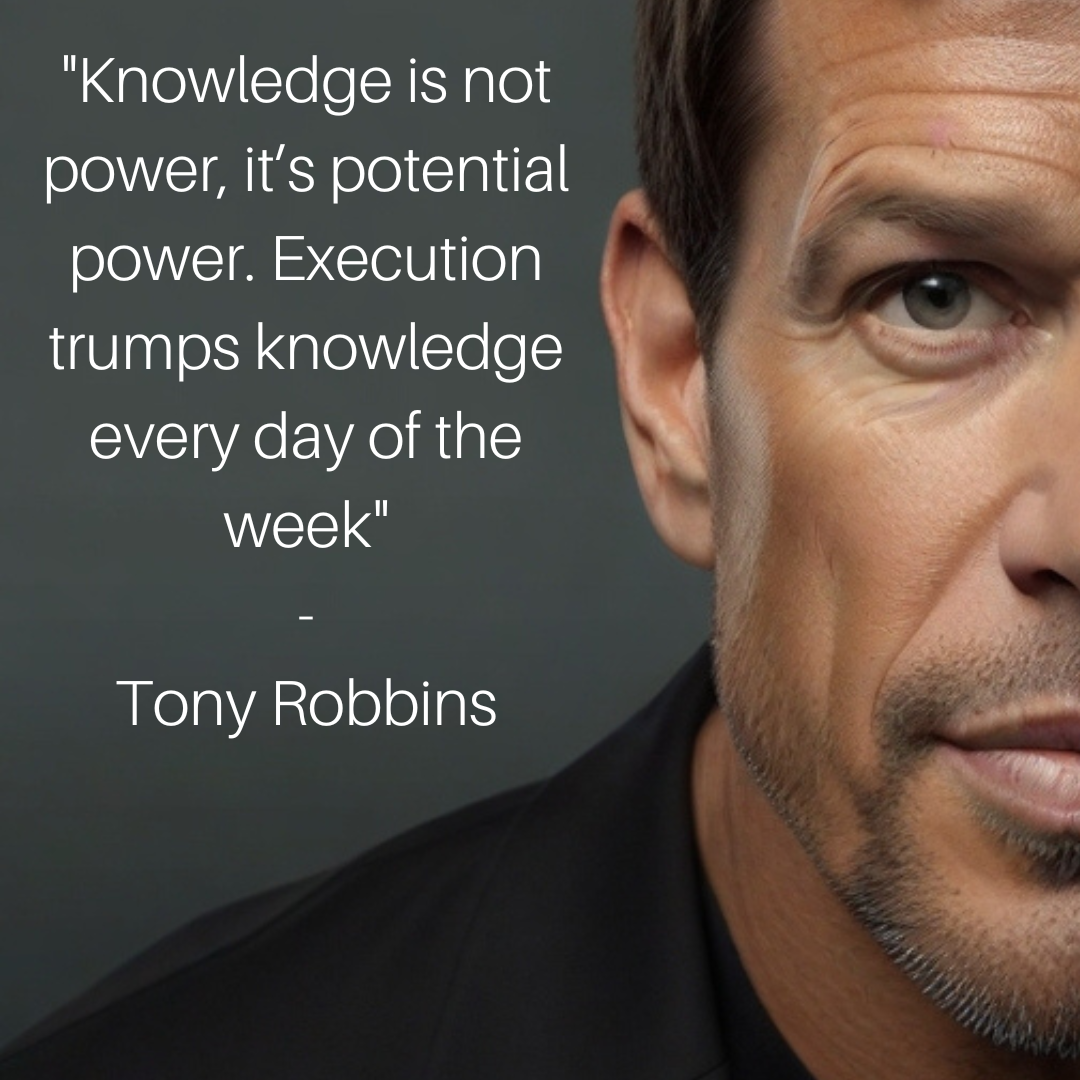Some links in this article may be affiliate links, meaning we may earn a small commission if you make a purchase through them.
“Knowledge is not power, it’s potential power. Execution trumps knowledge every day of the week”
Tony Robbins
Introduction:
In the pursuit of success, the interplay between knowledge and execution is paramount. As Tony Robbins said, “Knowledge is not power, it’s potential power. Execution trumps knowledge every day of the week.” This insight underscores the essence of harnessing both knowledge and action to achieve one’s goals. In this comprehensive guide, we delve into the dynamic relationship between knowledge and execution, exploring how they synergize to unlock the full potential within us.
Understanding the Power of Knowledge:
Knowledge is the cornerstone of human progress, shaping our understanding of the world and guiding our actions. It encompasses a broad spectrum of information, ranging from academic expertise to practical know-how, acquired through formal education, personal experiences, and continuous learning. However, the true power of knowledge lies not merely in its accumulation but in its application to solve problems, innovate, and drive positive change.
In the realm of entrepreneurship, Steve Jobs serves as a compelling example of the symbiotic relationship between knowledge and grit. Jobs’ insatiable curiosity and deep understanding of user experience fueled his visionary approach to product design and innovation at Apple Inc. From the revolutionary iPhone to the iconic Macintosh computer, Jobs’ relentless pursuit of excellence propelled Apple to become one of the most valuable companies in the world. His unwavering commitment to pushing the boundaries of technology and design exemplifies the transformative potential of knowledge when coupled with relentless determination.
The Role of Execution in Powering Success:
Execution serves as the linchpin of success, bridging the gap between knowledge and tangible results. It encompasses the practical application of ideas, plans, and strategies to achieve desired outcomes. While knowledge provides the foundation for informed decision-making, it is through execution that ideas are brought to life and transformative change is realized.
Research conducted by the Harvard Business Review has highlighted the critical importance of execution in driving organizational success. In a study analyzing the performance of top executives, researchers found that effective execution was a defining characteristic of successful leaders. These leaders not only possessed strategic vision and intellectual prowess but also demonstrated a relentless focus on implementation and follow-through. By translating vision into action, they were able to deliver measurable results and propel their organizations forward.
Real-life examples further underscore the pivotal role of execution in driving success. Consider the story of Elon Musk, the visionary entrepreneur behind companies like SpaceX and Tesla. Musk’s ambitious goals, such as colonizing Mars and accelerating the transition to sustainable energy, exemplify the power of bold vision. However, it is Musk’s unwavering commitment to execution that sets him apart. From the successful launch and landing of reusable rockets to the mass production of electric vehicles, Musk’s ability to execute on audacious ideas has propelled him to the forefront of innovation.
Moreover, case studies in business and management literature provide valuable insights into the principles of effective execution. Companies like Amazon and Toyota have become synonymous with operational excellence, leveraging systematic approaches such as Lean Six Sigma and Just-in-Time manufacturing to streamline processes and drive efficiency. By fostering a culture of continuous improvement and empowering employees to take ownership of execution, these organizations have achieved sustained success in highly competitive markets.
On an individual level, disciplined execution is essential for personal achievement and goal attainment. Whether pursuing career aspirations, fitness goals, or academic objectives, the ability to execute with precision and consistency is paramount. Research in psychology has identified key factors that contribute to effective execution, including goal setting, time management, and self-discipline. By cultivating these skills and habits, individuals can maximize their productivity and overcome obstacles on the path to success.
Numerous case studies illustrate the transformative power of execution in diverse contexts. For instance, Elon Musk’s visionary leadership at SpaceX exemplifies the impact of bold execution in revolutionizing space exploration. Despite facing formidable challenges, Musk’s unwavering commitment to his vision propelled SpaceX to unprecedented achievements, including the successful launch and landing of reusable rockets. Similarly, the rise of companies like Amazon and Google underscores the importance of relentless execution in disrupting industries and reshaping the business landscape.
Real-Life Examples of Knowledge and Execution: Consider the story of Sara Blakely, the founder of Spanx, whose journey from aspiring entrepreneur to self-made billionaire epitomizes the fusion of knowledge and execution. Armed with a deep understanding of consumer needs and a relentless drive to innovate, Blakely transformed her idea for shapewear into a global empire through strategic execution. Despite facing numerous setbacks and naysayers, Blakely’s unwavering belief in her vision and her willingness to take calculated risks propelled Spanx to unprecedented success.
Unlocking Your Potential Through Knowledge and Execution:
To unleash your full potential, it is essential to cultivate a symbiotic relationship between knowledge and execution. Begin by fostering a growth mindset—a belief that your abilities can be developed through dedication and hard work. Invest in continuous learning and seek out opportunities to expand your knowledge base, whether through books, courses, or mentorship. Equally important is the discipline to translate your knowledge into action through focused execution. Set clear goals, develop actionable plans, and stay committed to seeing them through, even in the face of adversity.
Real-life examples abound of individuals who have leveraged the power of knowledge to achieve remarkable success. Take the story of Warren Buffett, one of the most successful investors of all time. Buffett is known for his voracious reading habit, consuming books and annual reports voraciously to deepen his understanding of business and finance. By continuously expanding his knowledge base, Buffett has been able to identify lucrative investment opportunities and generate substantial wealth over the years.
Equally important is the discipline to translate knowledge into action through focused execution. Setting clear goals, developing actionable plans, and maintaining unwavering commitment are essential components of effective execution. Research in psychology has identified the role of goal setting in driving motivation and achievement. According to the Goal Setting Theory proposed by Edwin Locke, setting specific and challenging goals can enhance performance and increase the likelihood of success.
Moreover, studies in behavioral economics have shed light on the importance of implementation intentions—the specific plans that outline when, where, and how goals will be pursued. By creating implementation intentions, individuals can overcome obstacles and increase their likelihood of following through on their intentions.
Conclusion:
In the dynamic interplay between knowledge and execution lies the key to unlocking our full potential and achieving extraordinary success. As Tony Robbins aptly put it, “Knowledge is not power, it’s potential power. Execution trumps knowledge every day of the week.” This profound insight underscores the importance of not only acquiring knowledge but also taking decisive action to translate that knowledge into tangible results.
Throughout this comprehensive guide, we’ve explored the transformative impact of knowledge and execution in driving personal and professional growth. From the visionary leadership of entrepreneurs like Steve Jobs and Elon Musk to the disciplined execution strategies of companies like Amazon and Toyota, the examples abound of how the fusion of knowledge and action can propel individuals and organizations to unprecedented heights.
By fostering a growth mindset and investing in continuous learning, individuals can expand their knowledge base and stay adaptable in an ever-changing world. Equally crucial is the discipline to translate that knowledge into focused execution, setting clear goals and implementing actionable plans to achieve desired outcomes. Whether pursuing entrepreneurial ventures, career aspirations, or personal goals, the synergy between knowledge and execution is the driving force behind success.
As we embark on our own journeys of growth and achievement, let us heed the lessons learned from those who have come before us. Let us embrace the power of knowledge to inform our decisions and guide our actions, and let us harness the force of execution to turn our dreams into reality. With determination, resilience, and a relentless pursuit of excellence, we can unleash our full potential and create a future filled with boundless possibilities.
Additional Resources: For further exploration of the power of knowledge and execution, consider the following books:
- “Steve Jobs” by Walter Isaacson – Offering an insightful look into the life and career of Steve Jobs, this biography delves into his visionary approach to innovation and the impact of his leadership on the technology industry.
- “The Lean Startup: How Today’s Entrepreneurs Use Continuous Innovation to Create Radically Successful Businesses” by Eric Ries
- “Execution: The Discipline of Getting Things Done” by Larry Bossidy and Ram Charan
- “Elon Musk: Tesla, SpaceX, and the Quest for a Fantastic Future” by Ashlee Vance – Offering a comprehensive look into the life and achievements of Elon Musk, this biography explores his ambitious goals and relentless pursuit of innovation.
- Good to Great: Why Some Companies Make the Leap…and Others Don’t” by Jim Collins – This book examines the factors that distinguish great companies from their competitors, highlighting the importance of disciplined execution and strategic decision-making.




